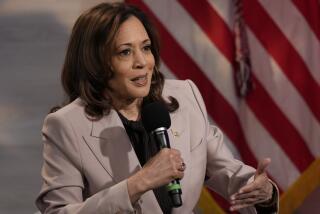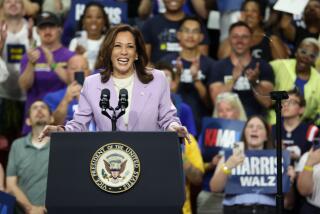The Grand Ol’ Media Tug of War
- Share via
PHILADELPHIA — It was the big “get” and CNN got it: the first extended interview with Republican vice presidential nominee Dick Cheney, who agreed to appear on “Larry King Live” the night of his official announcement, just days before the official Republican National Convention kickoff this week.
But such coups are rare these days at an event such as the Republican convention. NBC News, whose broadcast network is devoting the least air time to the conventions (deferring to its much-smaller cable network MSNBC) complained about being stiffed at one point by the Republicans when they wanted to book photogenic George P. Bush, 24-year-old nephew of the nominee. But in reality, with three cable news networks with virtually unlimited air time to fill and plenty of guests to go around, the party and networks jockey more often not over exclusivity, but such things as timing and subject matter.
Indeed, GOP planners are delighted over the media’s ravenous hunger for party loyalists--the more air time they occupy with George W. Bush surrogates, the less time there is for his opponent. On Monday alone, the party’s communications office booked about 300 appearances for Bush supporters on broadcast, cable and Internet shows.
“If there’s anything that really distinguishes this convention, it’s the incredible explosion in the demand for content,” said Leslie Goodman, chief of the communications office. The rise of 24-hour news networks means “everybody’s a wire [service] now. The demands to keep that pipeline filled are extraordinary.”
To position its spokespeople for maximum exposure, the party began locking in appearances for top “gets” days before they arrived in Philadelphia. Inside the communications outfit, separate divisions book guests on network television, local programs, radio and the Internet. And in the bowels of the First Union Center, the party puts its top spokespeople in a chair and beams interviews with them to local TV anchors around the country. The party reserved eight hours a day of satellite time for the four-day convention.
Getting its surrogates on local broadcasts is critical to the GOP’s media strategy (and the Democrats’) because the parties believe large blocks of swing voters who aren’t tuned into the campaign will get their political information primarily from local sources.
“That’s where the news is really made,” Goodman said. “It’s a lot easier to make an emotional connection to something that’s closer to your community.”
But that doesn’t mean the party won’t grab every chance to book Bush camp appearances on media outlets big and small.
Far from being hard to land, George P. Bush was even being made available to MTV’s “Choose or Lose” team and a Latino talk show on Internet site MediaBureau.com, one of two dozen credentialed online sites scurrying for content in the press encampment outside the convention hall. On Monday, the Texas governor’s nephew went from network booth to network booth. His struggle was to keep the conversation on the message--how Latinos feel about the Republican candidate (his mother was born in Mexico)--and deflect questions such as one from Fox News Channel’s Paula Zahn about his recent nomination to the ranks of People magazine’s 100 most eligible bachelors (he was No. 4).
On Monday alone, CNN booked more than 40 guests, from, yes, George P. Bush to the ubiquitous Jim Nicholson, chairman of the Republican National Convention, to retired Gen. Colin Powell, the night’s big speaker. He agreed to do about 15 minutes of “Larry King Live” at midnight Eastern time, which put him in prime 9 p.m. Pacific time.
It’s a familiar test of wills for seasoned television producers who need the guests but want to pursue their own agenda even as the parties have their own message to spread.
“Each party is trying to control how their message gets out and every booker and producer is trying to figure out a way to do it differently than they want. In the long run, it ends up you get a little of what they want and a little of what you want,” says Gail Evans, the CNN executive vice president who oversees the cable news channel’s booking operation.
George P. Bush has been a pawn, of sorts, for the two sides of the booking battle since as far back as 1988, when his grandfather was running for the presidency. During the Republican convention in New Orleans that year, ABC’s “Good Morning America” wanted to get an interview with the candidate’s wife, Barbara. The campaign, wanting to project then-Vice President George Bush as a family man, countered by suggesting the program also take the Bushes’ son Jeb and Jeb’s son--yes, George P., who was 12. All three appeared together on the program.
For most official guests, news operations must go through the parties, who assign each network an advocate to fight for guest bookings. One of CNN’s contacts within the Republicans, Alixe Glen, has worked with the network since the days of President Ronald Reagan, when it was in its infancy, says Evans. Another of CNN’s key contacts in the campaign even worked for the network at one point, giving both sides a comfort level. And if the official booker within the party can’t get a network what it wants, there are often plenty of ways around the problem.
“The party wants to control all these bookings, but ultimately all these people want to get on your air,” says Evans. If all else fails, there’s always the possibility of randomly grabbing the person as they wander the convention floor, and throwing a microphone and camera in their face. CNN booked dozens of people from the floor on Monday.
Even with three cable news networks this year, bookers say the competition for guests hasn’t dramatically heated up. Fox News Channel is the one real newcomer; MSNBC, which had only been on the air for a few weeks at convention time in 1996, is coordinating its booking through NBC News. “We’re in far better shape than four years ago,” says Chris Brown, Washington producer for MSNBC’s “The News With Brian Williams.” Then, he says, the new network was reeling from the crash of TWA Flight 800 and the Olympic Park bombing, it didn’t have the help of NBC News’ more seasoned operation, and “people didn’t quite know what exactly we were.”
Today, MSNBC is just another part of the mix, one more interview to add to the long list.
More news outlets, according to Evans, just means “that the schedules of interviews for most people is longer and you may not get that person in exactly the moment you want them.”
*
More GOP Coverage: * Howard Rosenberg’s column on television coverage of the Republican convention is in the A section.
More to Read
Get the L.A. Times Politics newsletter
Deeply reported insights into legislation, politics and policy from Sacramento, Washington and beyond. In your inbox twice per week.
You may occasionally receive promotional content from the Los Angeles Times.










